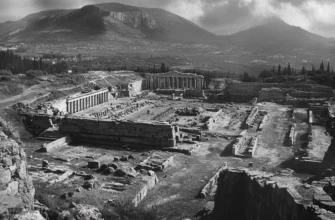The Athenian state was founded around 508 BC and changed in accordance with historical events. The most famous period was the 5th-4th centuries BC, when a cultural and scientific revolution took place. Athenian democracy became the first form of government in the West, where power belonged to the people. However, after its defeat in the Peloponnesian War, it lost its influence. In the 4th century BC, the state experienced a crisis associated with an increase in the number of slaves and a decline in the role of democracy. During the Macedonian Empire, the Athenian state retained its cultural and scientific influence but was no longer the center of political power. Culture and science in Athens developed actively and made a significant contribution to world history.
- Historical events that led to the creation of the Athenian state
- Description of the political system and administration in Athens
- The role of Athens in Ancient Greece
- Development of the Athenian state
- The era of foundation and the beginning of democracy
- The heyday and crisis of the Athenian state
- The state of Athens during the Macedonian Empire
- Culture and science in Athens
- Philosophy and thinking of the Athenian school
- Art and architecture in Athens
- Inventions and scientific achievements of the Athenian state
- Consequences and legacy of the Athenian state
- The legacy of Athenian democracy
- The influence of Athenian culture on the modern world
- The consequences of defeat in the Peloponnesian War and the decline of the Athenian state
- Conclusion
Historical events that led to the creation of the Athenian state
The Athenian state emerged as a result of political reforms that took place in Attica (the region where Athens was located) in the 7th-6th centuries BC. Instead of a monarchy, an archontate was established – a collegium of elected state leaders, and later a council composed of representatives of five families. These reforms made it possible to change the form of government and increase the role of the people in the administration of the state. In 508 BC, democracy was introduced, which became a symbol of the Athenian state and the first form of government in the West where power belonged to the people.
Description of the political system and administration in Athens
Athenian democracy was based on the principle of direct democracy, where every citizen could participate in the meetings of the Ecumenical Council (the Athenian parliament) and vote on bills. The state was governed by councils and local governments. The main positions in the government were chosen by lottery to avoid corruption and the influence of financial interests. Power was divided between the demos (the people) and the aristocrats, which ensured a balance of power in the state. All decisions concerning the state were made at general assemblies of citizens, where everyone had the opportunity to express their opinion and vote. This form of government ensured a high level of democracy and openness of power.
The role of Athens in Ancient Greece
Athens played a key role in Ancient Greece as a political and cultural center. During its heyday in the 5th century BC, Athens was one of the largest and most powerful states in Greece, exerting considerable influence on the region and the world. During this time, Athens developed a rich culture, science, and art, and implemented a series of reforms that ensured a high level of democracy and equality before the law. Athenian philosophers such as Socrates, Plato, and Aristotle made significant contributions to the development of philosophy and science. The Acropolis of Athens, which included the Parthenon and other buildings, became a symbol of ancient culture and architecture and is one of the most famous tourist attractions today.
Development of the Athenian state
The Athenian state developed from a small polis into a large empire over many centuries. It went through numerous trials, including periods of prosperity, decline, wars, and reforms. In the 5th century BC, Athens was the most powerful state in Greece and founded the Delian League, which united most of the Greek city-states. In the 4th century BC, Athens became part of the Macedonian Empire and was later conquered by the Romans. Throughout its history, Athens underwent a series of reforms that promoted the development of democracy and human rights and became a source of many achievements in science, art, architecture, and philosophy.
The era of foundation and the beginning of democracy
The Athenian state was founded in the 7th century BC, when it became the first Greek state to establish a democratic system of government. In the 6th century BC, Athens underwent a series of reforms that contributed to the development of democracy and human rights. In 508 BC, democracy was established, under which political decisions were made at general assemblies of citizens who had the right to vote. During this period, laws and institutions were created in Athens that still serve as an example for democratic systems around the world.
The heyday and crisis of the Athenian state
The Athenian state reached its peak in the 5th century BC, when it became the most powerful state in Greece and founded the Delian League. During this period, Athens was known for its achievements in science, art, and architecture. However, after its defeat in the Peloponnesian War against Sparta in the 4th century BC, the Athenian state began to experience a crisis that led to its decline. Throughout the centuries, Athens experienced various periods of decline and revival, but remained an important center of culture and art in Greece until its conquest by the Romans in the 2nd century BC.
The state of Athens during the Macedonian Empire
In the 4th century BC, the Athenian state fell under the influence of the Macedonian Empire after its defeat in the Peloponnesian War. Macedonian King Philip II and his son Alexander the Great changed the political landscape of Greece and Athens by establishing a monarchy. Athens remained an important center of culture and art, but its political and military capabilities were limited. After the death of Alexander the Great in 323 BC, Athens and other Greek cities fought for independence but were unsuccessful. In 146 BC, Athens was conquered by Rome and turned into a province of the Roman Empire.
Culture and science in Athens
Athens was considered one of the most culturally developed cities of Ancient Greece. Art, architecture, philosophy, literature, and science flourished there. Athens was the birthplace of such outstanding philosophers as Socrates, Plato, and Aristotle. It was home to the Academy, Plato’s school, and the Lyceum, Aristotle’s school. Athens was famous for its architecture, including the Parthenon, an ancient temple that has survived to this day. In literature, Athens is known for authors such as Aeschylus, Sophocles, Euripides, and Aristophanes. Science also flourished here, particularly astronomy, mathematics, and medicine. In general, culture and science in Athens flourished between the 5th and 4th centuries BC.
Philosophy and thinking of the Athenian school
The philosophy of the Athenian school played a major role in the development of Western philosophy. It formulated the fundamental questions and problems that are still studied by philosophers today. Athenian philosophers, particularly Socrates, Plato, and Aristotle, believed that humans could attain truth through reason and moral values. They developed ideas about goodness, justice, beauty, and idealized democracy and republicanism as forms of government. The Athenian school was also known for its contributions to logic and metaphysics, exploring questions about the nature of man and his place in the universe. In general, Athenian philosophy is a very important part of the cultural heritage of Ancient Greece and is significant for the development of philosophical thought from the Renaissance to the present day.
Art and architecture in Athens
Art and architecture in Athens were among the most important in Ancient Greece. Athenian artists created great masterpieces in various genres, including painting, sculpture, and ceramics. They reflected the life and culture of the Athenian state, in particular the famous Athenian vases depicting mythology and the history of the state.
Architecture in Athens was also highly developed. Many architectural monuments have survived to this day, including the Acropolis, which was the center of Athenian culture and religion. Here you can see famous buildings such as the Parthenon, the Erechtheion, and the Propylaea, which are considered some of the most outstanding examples of classical Greek architecture. The architecture of Athens also played an important role in the development of architecture in Western Europe and beyond.
Inventions and scientific achievements of the Athenian state
The Athenian state was a center of scientific and philosophical research in Ancient Greece. Such outstanding scientists as Plato, Aristotle, Thucydides, and Herodotus lived and worked here. They developed theories about the nature of the world, morality, ethics, politics, and more.
In addition to philosophy, the Athenian state is also known for its achievements in mathematics, geometry, astronomy, and medicine. For example, Euclidean geometry was created in Athens and is still used in school mathematics today. Astronomers in Athens developed theories about the movement of the planets, and doctors studied various diseases and treatments.
In addition to science, the Athenian state also contributed to the development of culture and art. Athenian artists created great works in various genres, including painting, sculpture, and ceramics. Architecture in Athens was also highly developed, and many architectural monuments have survived to this day, including the Acropolis with its famous buildings.
Consequences and legacy of the Athenian state
After the heyday of the Athenian state, difficult times followed, associated with the destruction of its fleet and the consequences of wars. However, the scientific and cultural achievements of Athens were preserved and passed on to future generations. Athens influenced the development of Western civilization, and its ideas and creativity influenced the art, architecture, philosophy, and science of the world. The legacy of Athenian democracy can still be felt today, with the ideas of “power of the people” and “equality before the law” becoming key components of modern democratic systems around the world.
The legacy of Athenian democracy
The legacy of Athenian democracy consists of many components, including the principles of equality before the law, freedom of speech, independence of the judiciary, and protection of human rights. These principles have become the foundation of many modern democracies and legal systems, and have also influenced the development of science, art, and philosophy. Athens became a symbol of culture, intellect, and democracy, and helped shape world history, reflecting the power and significance of democratic values.
The influence of Athenian culture on the modern world
Athens culture has had a profound influence on the modern world. Philosophers of the Athenian school, such as Socrates, Plato, and Aristotle, became symbols of thought and reason that continue to inspire people today. The art and architecture of Athens, such as the Parthenon and the statues on the Acropolis, are examples of beauty and harmony. The principles of democracy and freedom of speech that emerged in Athens became the foundation of many modern democracies and legal systems. Overall, Athenian culture is one of the most influential cultural sources in world history, which continues to inspire and influence the modern world.
The consequences of defeat in the Peloponnesian War and the decline of the Athenian state
The defeat in the Peloponnesian War and its consequences led to the decline of the Athenian state. Financial and economic problems, loss of influence on the international stage, and a reduction in territory led to the decline of Athens as a political and military power. However, the spiritual heritage of Athenian culture, its philosophy, art, and architecture, remain influential even in the modern world. The influence of Athenian democracy and its principles on the modern political and legal system is also noticeable. Thus, although the Athenian state fell, its legacy and influence on the world remain significant to this day.
Conclusion
The Athenian state was an important center of culture, science, and democracy in Ancient Greece. The development of Athens took place through a number of important historical events that influenced its political, social, and cultural spheres. The inventions, scientific achievements, and philosophical ideas of the Athenian school are reflected in the modern world. The consequences of the defeat in the Peloponnesian War and the decline of the state are still felt today, but the legacy of Athenian democracy remains an important asset for humanity.








